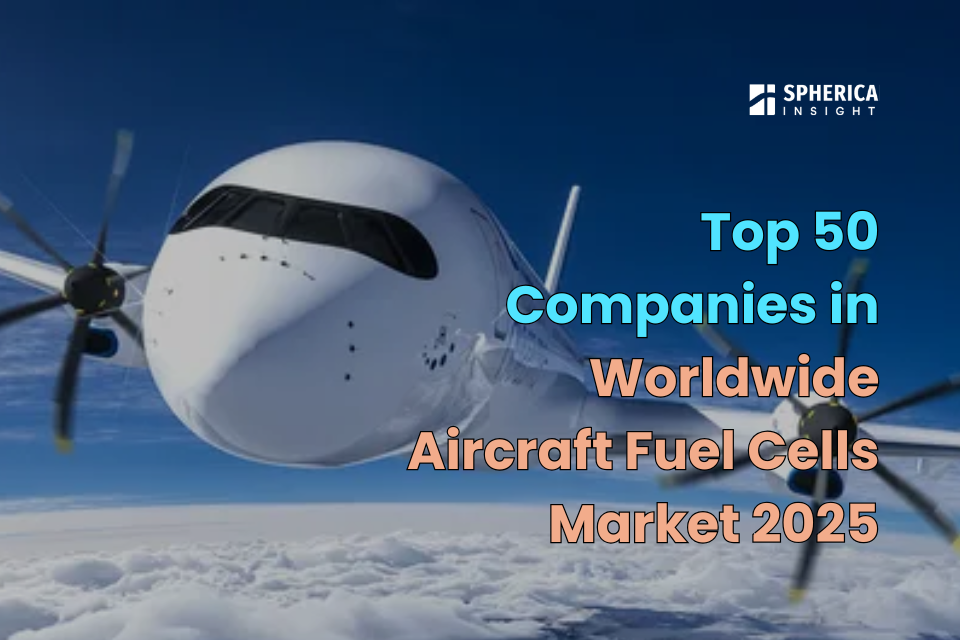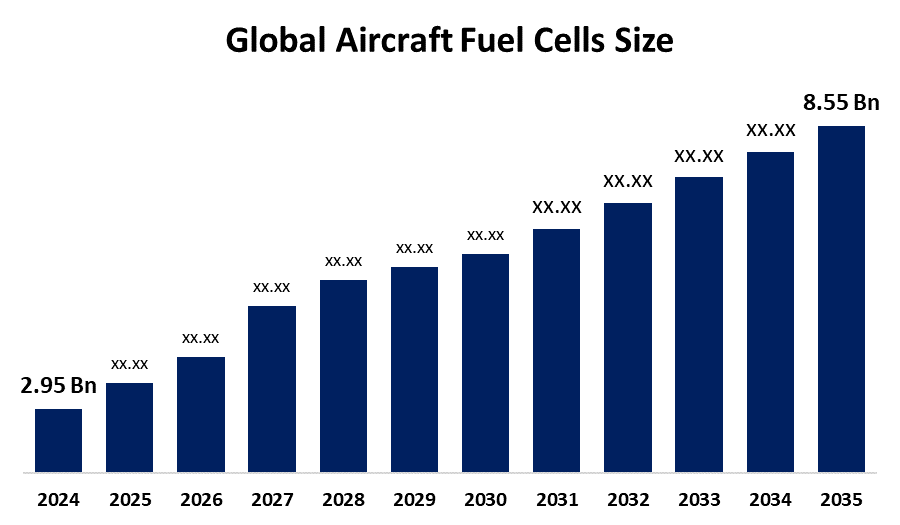
Top 50 Companies in Worldwide Aircraft Fuel Cells Market 2025: Market Research Report (2024–2035)
RELEASE DATE: Sep 2025 Author: Spherical InsightsRequest Free Sample Speak to Analyst
Description
According to a research report published by Spherical Insights & Consulting, The Global Aircraft Fuel Cells Market Size is projected to grow from USD 2.95 Billion in 2024 to USD 8.55 Billion by 2035, at a CAGR of 10.16% during the forecast period 2025–2035. The growing factors consist of improvements in fuel cell technology, heightened emphasis on minimizing the aviation carbon footprint, and favorable government policies. The market expansion is additionally bolstered by rising funding in research and development, partnerships between aviation and energy firms, and the growth of green hydrogen infrastructure.
Introduction
The worldwide aircraft fuel cells market refers to the sector which devoted to the advancement, integration, and marketing of electrochemical power systems, mainly hydrogen-derived, that produce electricity for aircraft propulsion and support systems. These fuel cells provide a clean, efficient, and low-emission option compared to traditional combustion engines, supporting aviation's drive for sustainability and adherence to regulations. The safety remains essential, with fuel systems designed to include features that prevent contamination, leaks, and fire risks. Moreover, the deployment of monitoring systems equipped with sensors and real-time diagnostics allows for early fault identification and improves operational safety. These improvements assist aircraft producers in meeting environmental and safety standards while guaranteeing peak aircraft performance.
Navigate Future Markets with Confidence: Insights from Spherical Insights LLP
The insights presented in this blog are derived from comprehensive market research conducted by Spherical Insights LLP, a trusted advisory partner to leading global enterprises. Backed by in-depth data analysis, expert forecasting, and industry-specific intelligence, our reports empower decision-makers to identify strategic growth opportunities in fast-evolving sectors. Clients seeking detailed market segmentation, competitive landscapes, regional outlooks, and future investment trends will find immense value in the full report. By leveraging our research, businesses can make informed decisions, gain a competitive edge, and stay ahead in the transition toward sustainable and profitable solutions.
Unlock exclusive market insights - Download the Brochure now and dive deeper into the future of the Aircraft Fuel Cells Market.
Aircraft Fuel Cells Market Size & Statistics
- The Market Size for Aircraft Fuel Cells Was Estimated to be worth USD 2.95 Billion in 2024.
- The Market is Going to Expand at a CAGR of 10.16% between 2025 and 2035.
- The Global Aircraft Fuel Cells Market Size is anticipated to reach USD 8.55 Billion by 2035.
- North America is anticipated to generate the highest demand during the forecast period in the global aircraft fuel cells Market.
- Asia Pacific is projected to grow the fastest during the forecast period in the global aircraft fuel cells Market.

Regional growth and demand
Asia Pacific is expected to grow the fastest during the forecast period in the global aircraft fuel cells market.
Japan and South Korea are at the forefront of hydrogen infrastructure advancement, whereas China is concentrating on increasing fuel cell manufacturing and implementation across various sectors. Government programs, such as subsidies and strategic policies, are encouraging progress in aviation fuel cell technology. Moreover, partnerships between aerospace firms and renewable energy companies are propelling innovation in the region. Further, current investments and regional collaborations are establishing the Asia Pacific as a significant market for aircraft fuel cells.
North America is expected to generate the highest demand during the forecast period in the global aircraft fuel cells market.
The United States and Canada, which host prominent aerospace firms and research organizations, are making substantial investments which majorly highlighted the market expansion. Further, government programs like financial aid for renewable energy initiatives and investment promote market expansion. The region's developed aviation sector, along with an increasing need for environmentally friendly options, is encouraging the integration of fuel cells in commercial, military, and unmanned aircraft. Moreover, partnerships between aerospace producers and hydrogen providers are speeding up progress in fuel cell technology.
Top 10 trends in the Aircraft Fuel Cells Market
Dominance of Hydrogen Fuel Cells
Integration of Hybrid Propulsion Systems
Focus on Small Platforms (UAVs, EVTOLs)
Growth in Lower Power Ranges (100 kW)
Propulsion vs Auxiliary Power Focus
Rising R&D and Government Support
Advances in Lightweight Materials & Construction Techniques
Infrastructure & Certification
Military & Defense Applications
Industry Demonstrations & Commercial Initiatives
Top 15 Companies Leading the Aircraft Fuel Cells Market
- Ballard Power Systems
- Air Products
- Iwatani
- Showa Denko
- Plug Power
- Doosan Fuel Cell
- Linde
- Nuvera Fuel Cells
- Ceres Power
- Hydrogenics
- Cummins
- Bloom Energy
- SAFT
- SFC Energy
- Praxair
1. Ballard Power Systems
Headquarters: British Columbia, Canada,
Ballard Power Systems is a key contributor in the creation and production of Proton Exchange Membrane (PEM) fuel cells, and it plays an important, albeit changing, role in the aerospace industry. In contrast to businesses that merely provide hydrogen or other parts, Ballard develops and manufactures the fuel cell stacks and systems that are central to hydrogen-electric propulsion. Ballard's main offering is its fuel cell stack, including the FCgen-LCS and FCgen-HPS series. These stacks serve as the essential components of a fuel cell system, and aerospace partners incorporate them into aircraft to supply power. A crucial characteristic of these stacks is their elevated power density and longevity, which are essential for the rigorous demands of flying. By providing and manufacturing the essential fuel cell components, it allows its aerospace collaborators to create the groundbreaking, clean-energy aircraft.
2. Air Products
Headquarters: Allentown, USA
Air Products is a prominent global company in industrial gases, and its involvement in the aircraft fuel cell industry is not in manufacturing the fuel cells but in being a vital supplier and facilitator of the whole hydrogen ecosystem. Their participation is essential to realizing hydrogen-powered aviation. Air Products has a lengthy background in providing gases to the aerospace sector. For many years, it has served as a vital provider of liquid oxygen and liquid hydrogen for rocket fuels, including NASA's Artemis missions and the Space Shuttle. This enduring partnership showcases the company's capability to meet the stringent technical and safety demands of the aerospace sector. Its function is to supply the vital hydrogen fuel and the crucial infrastructure needed to turn hydrogen-powered flight into a reality. Without firms such as Air Products, the aerospace sector's ambitious targets for decarbonization via hydrogen would be unattainable.
3. Linde
Headquarters: Surrey, United Kingdom
Linde plc, created through the merger of Praxair and Linde AG, is a worldwide frontrunner in industrial gases and engineering. Although the company does not directly produce aircraft fuel cells, its involvement in the hydrogen economy positions it as an essential facilitator for the future of hydrogen-powered flight. Linde is partnering with leading aerospace companies to establish the essential ecosystem for hydrogen-powered flight. A significant illustration is its collaboration with Airbus, revealed in 2022. The two firms are collaborating to create hydrogen infrastructure at airports across the globe, including executing pilot projects at numerous locations to assess the viability of hydrogen supply chains
4. Ceres Power
Headquarters: West Sussex, United Kingdom
Ceres Power is a UK-based firm focused on the development and licensing of Solid Oxide Fuel Cell (SOFC) technology. Although their technology serves numerous purposes, such as stationary power generation and hydrogen production, they are not presently a main producer of fuel cells for aviation. Their contribution to the aviation industry is more indirect, yet remains very important. Ceres's foundational technology, the "SteelCell," serves as a fuel cell for electricity generation, but it also functions efficiently in reverse as a Solid Oxide Electrolysis Cell (SOEC). In this state, it utilizes electricity to divide water into hydrogen and oxygen. This is an essential role for the future of aviation, as it offers a means for the efficient generation of green hydrogen, which is vital for direct application in aircraft fuel cells or for producing sustainable aviation fuels (SAFs).
5. Praxair
Headquarters: Danbury, USA
Praxair is a significant industrial gases firm, but in 2018, it combined with Linde AG to create Linde plc, now the largest industrial gas firm globally. Consequently, details regarding Praxair's present engagement in aircraft fuel cells are now connected to Linde's operations. Praxair, and currently Linde, does not produce the fuel cells directly. Rather, their role is essential to the technology, as they are a primary provider of the crucial element: hydrogen. Linde is a frontrunner in the complete hydrogen value chain, encompassing production, processing, distribution, and storage. They are an essential provider of gaseous and liquid hydrogen for multiple sectors, including the emerging hydrogen aviation industry. Linde is engaged in advancing hydrogen aviation technology. The firm aims to establish itself as a crucial facilitator of a future hydrogen economy in transportation, particularly targeting the aerospace sector.
Are you ready to discover more about the aircraft fuel cells market?
The report provides an in-depth analysis of the leading companies operating in the global aircraft fuel cells market. It includes a comparative assessment based on their product portfolios, business overviews, geographical footprint, strategic initiatives, market segment share, and SWOT analysis. Each company is profiled using a standardized format that includes:
Company Profiles
- Ballard Power Systems
- Business Overview
- Company Snapshot
- Products Overview
- Company Market Share Analysis
- Company Coverage Portfolio
- Financial Analysis
- Recent Developments
- Merger and Acquisitions
- SWOT Analysis
- Air Products
- Iwatani
- Showa Denko
- Plug Power
- Doosan Fuel Cell
- Linde
- Nuvera Fuel Cells
- Ceres Power
- Hydrogenics
- Cummins
- Bloom Energy
- SAFT
- SFC Energy
- Praxair
Conclusion
With a compound annual growth rate (CAGR) of more than 10%, the global aircraft fuel cells market is expected to increase significantly between 2025 and 2035, rising from USD 2.95 billion in 2024 to an astounding USD 8.55 billion by 2035. The industry is fueled by technological advancements, aggressive decarbonization plans, and encouraging policy frameworks. It also enjoys the benefits of previous R&D expenditures and strong collaborations with leaders in the fields of energy, aviation, and hydrogen infrastructure. While North America continues to dominate in demand driven by well-established aerospace companies, research organizations, and sustainability mandates, Asia Pacific is the fastest-growing area due to hydrogen infrastructure initiatives and a boom in collaborative innovation. The market is being shaped by industry leaders, including Ballard Power Systems, Air Products, Linde, Plug Power, Ceres Power, Praxair, and Nuvera, making it possible for emission-free propulsion, hybrid systems.
About the Spherical Insights & Consulting
Spherical Insights & Consulting is a market research and consulting firm which provides actionable market research study, quantitative forecasting and trends analysis provides forward-looking insight especially designed for decision makers and aids ROI.
Which is catering to different industry such as financial sectors, industrial sectors, government organizations, universities, non-profits and corporations. The company's mission is to work with businesses to achieve business objectives and maintain strategic improvements.
CONTACT US:
For More Information on Your Target Market, Please Contact Us Below:
Phone: +1 303 800 4326 (the U.S.)
Phone: +91 90289 24100 (APAC)
Email: inquiry@sphericalinsights.com, sales@sphericalinsights.com
Contact Us: https://www.sphericalinsights.com/contact-us
Need help to buy this report?